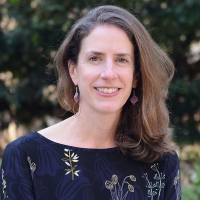Katherine Unger Baillie
Director

Katherine (Katie) Unger Baillie serves as the Environmental Innovations Initiative's staff director, working closely with the faculty director and staff, as well as colleagues around the University of Pennsylvania, to run programs and forge connections that accelerate transdisciplinary climate and environmental research and education. Prior to joining EII in 2023, she was the senior science news officer within Penn’s Office of University Communications, covering life science news and research for Penn Today. Katie earned a master’s in environmental studies from Penn, with a concentration in resource management; a master’s in science writing from Johns Hopkins University; and a bachelor’s in biology from Haverford College.
Heidi Wunder-Riegel
Associate Director

As Associate Director of Penn's Environmental Innovation Initiative, Heidi Wunder-Riegel is responsible for creating and carrying out a visibility strategy aimed at elevating the climate, environment, and sustainability research and teaching being done throughout the University. Previously, Heidi spent a dozen years in Penn's Facilities & Real Estate Services division, where part of her work involved managing communications for the Penn Sustainability Office. Heidi has a master's degree in English from Rosemont College, located in Greater Philadelphia, and a bachelor's degree in communications at American University in Washington, DC.
Ximena Trujillo
Senior Research Coordinator

Ximena (Xime) Trujillo is the Research Coordinator for the Environmental Innovations Initiative. Her drive is to articulate local actions with global goals to advance in the path of balance between humans and nature. She is an environmental engineer with a master’s in civil engineering from Universidad de los Andes, Colombia. She also holds a M.Sc. in Environmental Sciences from University of Lausanne, Switzerland. Before joining the Initiative in 2022, she worked on water management, in Latin America and Europe, and in research communications at international organizations and higher education institutions in Europe and United States. In this position, she will focus on data management and strategic planning to foster interdisciplinary research collaborations at Penn. Also, she is a mentor at Penn Engineers without Borders (EWB), a member of Penn in Latin America & the Caribbean (PLAC), and a fellow of the ISCN.
Kate La Spina
Program Coordinator

Kate La Spina is the Program Coordinator at the Environmental Innovations Initiative and is excited to facilitate programming at Penn to foster knowledge about climate change and environmental issues. Before joining the Initiative, Kate worked as the STEM Tutoring Coordinator at the Weingarten Center. Currently pursuing a dual concentration in environmental biology and policy within the Master of Environmental Studies program at Penn, Kate also holds a master's in Science Education from the American Museum of Natural History and a bachelor's in Ecology and Environmental Science from the University of Maine.
Kathleen D. Morrison
Faculty Director

Kathleen D. Morrison is the Sally and Alvin V. Shoemaker Professor of Anthropology, curator in charge in the Asian Section at the University of Pennsylvania Museum of Archaeology and Anthropology, director of the Penn Paleoecology Lab, and faculty director of the Environmental Innovations Initiative. Her research focuses on anthropogenic changes in land use and land cover at local, regional, and global scales. Current projects include LandCover6k, a global database of Holocene land use and land cover, and South Indian Landscape Trajectories, an analysis of the last 5,000 years of farming, food, and power, and their connections to environmental change in the semi-arid regions of peninsular India.